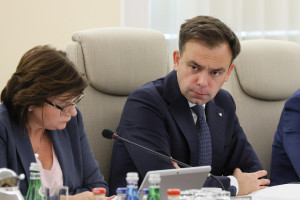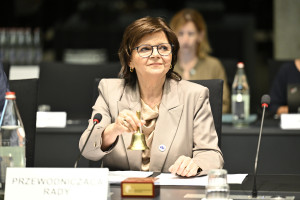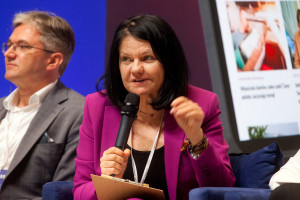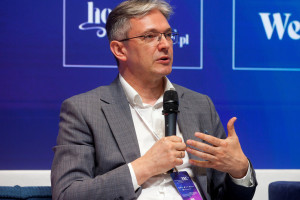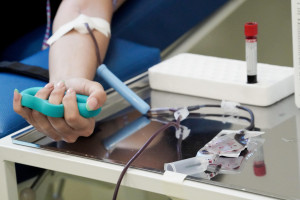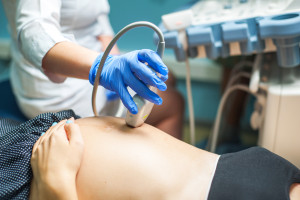"Difficult times create a strong presidency." Four key achievements of Poland

The Polish presidency of the EU Council is coming to an end. Has Poland used this time well? In the opinion of Deputy Minister of Health Katarzyna Kacperczyk, we can point to elements that "we have instilled a little in the European Union". She pointed to four key achievements:
- A paradigm shift – health is recognized as the foundation of security, not just one of its elements.
- Restoring the patient perspective in the European Union – the Polish Presidency recalled that all EU regulations should focus on the patient as the recipient of the system.
- Health in all sectoral policies – she called for the introduction of a “health test” for new regulations, similar to the existing business-friendly tests.
- Co-responsibility – she emphasized that the success of the presidency is the result of cooperation between the government, administration, the private sector and social organizations, and the final settlement will be the response to patients.
- Health has become one of the seven elements of security. This is our priority of the presidency, because health is the foundation and an absolutely key element of the country's security - she said.
- Difficult times create a strong presidency. And it was our luck that we have really difficult challenges that actually come together in one place, at some point - said Jakub Adamski, director of the Department of Cooperation of the Patient Rights Ombudsman.
In his opinion, Poland has successfully identified key priorities, including security, vaccinations, EHDS, AI and the fight against disinformation, and one of our successes has been the ability to direct the EU debate and to remind that some actions are easier and more effective to implement jointly, at the EU level, than individually by Member States.
MEP Adam Jarubas, chairman of the EP Public Health Subcommittee, stressed that the Polish presidency came at a strategic moment for planning long-term EU priorities . - Each institution plans its priorities for five years, so we had a truly unique window to get there and we used it to raise awareness of how important security is, including health - he assessed. He also pointed out that work on the new EU budget, until 2034, is now starting at the EU forum. In his opinion, it has been possible to give health a proper place on the EU agenda, alongside military issues.
He pointed to the need to continue programs such as EU4Health and Horizon, strengthen cooperation within the STEP platform and develop common mechanisms, such as joint purchases of medicines or cross-border services. He called for further promotion of a culture of cooperation in health.
The debate participants assessed the Polish presidency of the EU Council as effective and important for the development of the health sector, promoting innovation, prevention and placing the patient at the center of the European Union's health policy. They emphasized that it brought many important achievements, especially in the pharmaceutical and biopharmaceutical sector, despite the difficult geopolitical situation.
Florence Baron-Papillon, Head of Strategic Projects, Corporate Public Affairs & Policy at Sanofi, noted that Poland has strengthened Europe’s position as a leader in innovation in biological and medical sciences and promoted a shift towards preventive healthcare , which will bring benefits in both the security and economic areas.
Geraldine Schenk, Country Director at Johnson & Johnson Innovative Medicine, expressed her admiration for the speed and commitment of Poland, which in six months managed to raise the quality of the debate, putting the patient at the centre and opening a dialogue with the pharmaceutical industry on access to innovation and European competitiveness.
Phil Krzyżek, president of the Employers' Association of Innovative Pharmaceutical Companies INFARMA, emphasized that Poland has raised the profile of health as a key element of security in Europe and mentioned the progress in the pharmaceutical package , especially important for biological drugs. He expressed hope that Poland will regain its position as a leader in medical and biological sciences, encouraging further actions in this direction.
Agnieszka Nowak-Musiej, medical director of PZU Zdrowie, drew attention to the growing importance of health prevention, including mental health , and welcomed the "Moje Zdrowie" program and the possibility of referring patients to dieticians as part of primary health care. She also emphasized the role of vaccinations in building society's resistance to health crises.
Małgorzata Bogusz from the European Economic and Social Committee (EESC) stressed that the Polish Presidency came at an important moment in the evolution of EU health policy – after the COVID-19 pandemic, which made EU institutions aware of the need to respond more strongly to citizens’ health challenges.
She pointed out that although many priorities consistent with the current directions of EU health policy (prevention, fight against cancer) were implemented during the Polish Presidency, the issue of rare diseases was not taken into account, which – although it was not a formal priority – remains present in the European debate.
Priorities of the Polish PresidencyBogusz emphasized that the current time is an exceptional "momentum" for health in the European Union - a situation that is conducive to real systemic changes. In contrast to the Polish presidency in 2011, the current one provides real opportunities for a lasting influence on EU health policy. She also indicated that within the presidency trio (Poland, Denmark, Cyprus) there is a constant dialogue on the continuation of activities and priorities, which bodes well for the future. She concluded with an optimistic statement that Poland has a chance to effectively use this favorable moment in EU health policy.
Deputy Minister Kacperczyk recalled the priorities of the Polish presidency
1. European Health Data Space (EHDS) Katarzyna Kacperczyk assessed the digitalization of health as a fundamental change for the entire EU, calling it a real revolution. She expressed hope that EHDS will not only improve the functioning of healthcare systems, but also strengthen cooperation between Member States and enable the development of modern therapies. However, she pointed out that the topic is difficult for the public to understand, which may pose a challenge in implementing new solutions.
2. Prevention and public health In the opinion of Deputy Minister Kacperczyk, there is a need for a critical look at the effectiveness of current prevention programs. Her goal is to collect good practices in the form of a report that could become a useful tool for designing more effective health policies. She expressed hope that in the new financial perspective it will be possible to increase EU funds for health, especially for the prevention of circulatory system diseases, which she considers one of the greatest health challenges in Europe.
3. Mental health of children and young people According to Katarzyna Kacperczyk, this topic requires immediate attention, especially in the context of the impact of new technologies and social media. In her opinion, the conclusions of the EU Council being prepared will have a significant impact on further actions of the Commission and the Member States, provided that an appropriate mandate is obtained. She expressed hope that mental health will become a cross-cutting element of all digital policies, and the health of young people will be truly protected. She emphasized the innovative approach of the Polish Presidency, which was to include young people in the work, expressing the belief that the voice of young people is crucial and adds authenticity to the solutions being created.
4. Drug Safety Katarzyna Kacperczyk considered drug safety to be an element of the EU's strategic autonomy, comparable to state security. In her opinion, actions are needed to restore the patient perspective to EU health policy. She drew attention not only to the physical availability of drugs, but also to economic availability, indicating that many people may not be able to afford to buy necessary therapies.
Regarding the pharmaceutical package, Kacperczyk admitted that she fears legislative chaos if work on it is not completed quickly – an excessive number of related regulations could drag out negotiations and make it difficult to implement new solutions. At the beginning of June, the European Union member states accepted the compromise on the pharmaceutical package, developed during the Polish presidency – which is our undoubted success. This ends two years of negotiations in the EU Council, but the work is not over yet. The next step is negotiations with the European Parliament on the final shape of this reform.
EU Drug Policy: Availability of Medicines and Leveling the GapAdam Jarubas called the regulations included in the pharmaceutical package and the Critical Medicines Act a new, comprehensive "medicines constitution" for Europe .
His assessment is clear: no similar reform has been undertaken for 20 years, and the current actions are necessary due to the crisis in the availability of medicines, the growing dependence on supplies from outside Europe (mainly from Asia) and the need to increase the EU's pharmaceutical independence.
At the same time, he admitted that the interests of states and the private sector (innovative vs. generic) make it difficult to reach an agreement on these issues.
Jarubas assessed that a healthy balance is needed between incentives for the innovative industry and the needs of patients and public budgets. He was critical of the argument that the length of patent protection encourages companies to move production outside Europe – in his opinion, economic factors such as energy costs and access to staff are decisive.
The MEP pointed to the glaring inequalities in access to medicines, for example between Poland and Germany, where some medicines reach the market on average two years later. Therefore, as he emphasized, the regulations proposed by the Parliament are aimed at equalizing access to innovative therapies and increasing the efficiency of the system.
Jarubas expressed hope that the final version of the pharmaceutical package:
- will increase the availability of innovative medicines by up to 15 percent,
- will respond to unmet medical needs (rare diseases, antibiotic resistance),
- will create mechanisms to support European production and innovation.
In his opinion, the pharmaceutical package, together with the Critical Medicines Act, is the most important legislative instrument for the future of health in Europe, which must respond to both geopolitical and social challenges.
Copyrighted material - reprint rules are specified in the regulations .
rynekzdrowia

